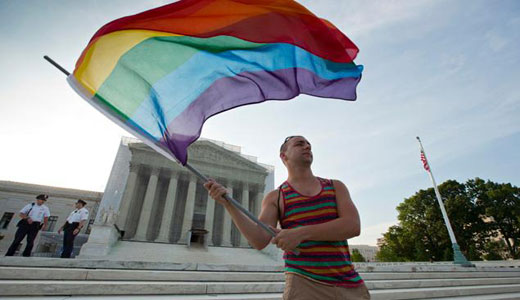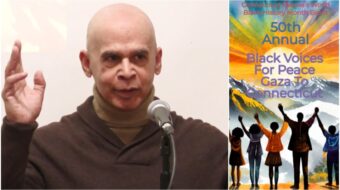
In a historic ruling for gay rights, the Supreme Court today struck down the Defense of Marriage Act, a 1996 law blocking federal recognition of same-sex marriages. It came on the eve of the anniversary of Stonewall, June 28, the 1969 event that marks the beginning of the modern U.S. struggle for lesbian, gay, bisexual, and transgender rights.
The Defense of Marriage Act, known as DOMA, amounted to “the deprivation of the equal liberty of persons that is protected by the Fifth Amendment,” wrote Justice Anthony Kennedy for the court majority in a 5-4 decision.
In a separate decision, the court said it would not consider the California Proposition 8 case and left in place a lower court ruling that the proposition, which banned same sex marriage in the state, was unconstitutional. The result is that gay marriage is once again legal in California.
The ruling overturning DOMA means the federal government must recognize same-sex marriages deemed legal by states. With the court’s ruling on Prop 8, now 13 states plus the District of Columbia have legalized same sex marriage.
“DOMA instructs all federal officials, and indeed persons with whom same-sex couples interact, including their own children, that their marriage is less worthy than the marriage of others,” the ruling today said. It also said the law was invalid because “there is no legitimate purpose for disparaging those whom states sought to protect in personhood and dignity.”
Moments after the ruling was announced President Obama, in a post on Twitter, said the decision was “a historic step forward for marriage equality.”
Kennedy, often considered the “swing” vote on the High Court, was joined in the majority by the four liberal justices, Justices Ruth Bader Ginsburg, Stephen Breyer, Sonia Sotomayor, and Elena Kagan. The dissenters were Chief Justice John Roberts and Justices Antonin Scalia, Clarence Thomas, and Samuel Alito.
Crowds outside the Supreme Court broke out into cheers with people waving signs and rainbow flags.
The largest federal employee union hailed the ruling.
“This ruling is a victory of equality over exclusion, of fairness over fear, of compassion over contempt,” declared David Cox Sr., president of the American Federation of Government Employees.
“As the Supreme Court has clearly decided, DOMA was an unconstitutional law that discriminated against a group of Americans for no other reason than their sexual orientation, denying them the basic rights and protections that so many of us take for granted,” AFGE General Counsel David Borer said.
The AFL-CIO, the nation’s largest labor federation, filed an amicus brief in March urging the Supreme Court to declare the Defense of marriage Act unconstitutional.
The case on which the Supreme Court ruled today, Windsor v. United States, involved New York resident Edie Windsor. Windsor sued the federal government after DOMA caused her to receive unequal tax treatment because of her same-sex marriage.
Windsor and Thea Spyer were a lesbian couple who lived together in New York for 44 years and got married in Canada in 2007.
When Spyer died in 2009, Windsor was billed $363,000 in federal estate taxes. Had the couple been considered by the federal government to be married, Windsor would not have received that tax bill.
Kennedy, in his ruling today, declared that New York’s decision to authorize gay marriage was a proper exercise of its authority, and reflected “the community’s considered perspective on the historical roots of the institution of marriage and its evolving understanding of the meaning of equality.”
Civil rights groups hailed the court’s ruling. “Today’s decisions mark a significant step forward for gay and lesbian Americans from the closet toward the sunlight of full recognition of their civil and human rights,” said Wade Henderson, president and CEO of the Leadership Conference on Civil and Human Rights.
“Today’s decisions show how far LGBT equality has come but also remind us how much work we have ahead to overcome discrimination, ensure employment rights and achieve full marriage equality.”
In a statement from the Human Rights Campaign, the group’s president, Chad Griffin, welcomed both DOMA and the California decisions, yet reminded the public the battle for marriage equality is not over. By not ruling on the Prop. 8 case, the court left it up to the states to decide whether or not to recognize same sex marriage.
“[T]hough today will be remembered as a watershed moment in the fight for equality, the court unfortunately stopped short of a broader decision on the fundamental right to marry,” he said. “Today’s victory, while joyous, is a reminder of the long road to win marriage equality nationwide.”
Photo: LGBT activists celebrate in front of the Supreme Court. J. Scott Applewhite/AP
Updated to reflect correction in date of Stonewall.












Comments